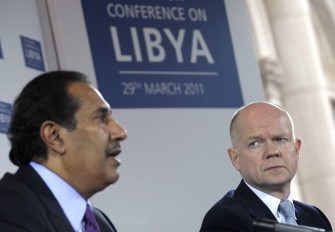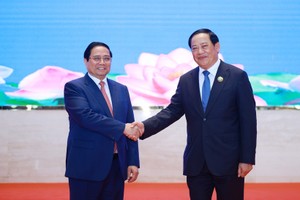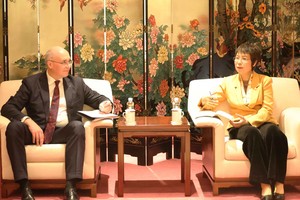LONDON, March 30, 2011 (AFP) - Some Arab countries appeared to distance themselves from Tuesday's London conference, held to plot a course for Libya's political transition, damping French and British hopes of building a consensus.
Several Arab states did not attend the meeting, which set up the Libya "contact group".
They included Egypt, where pro-democracy protesters forced Hosni Mubarak from power last month; and Algeria, where President Abdelaziz Bouteflika has been confronted with a wave of protests by pro-reform activists.
Amr Mussa, the Arab League chief, was represented by an ambassador after declining to take up his invitation.
An Egyptian diplomat put Mussa's low profile down to concerns over NATO's assumption of responsibility for military operations in Libya -- as well as the uncertainty surrounding ongoing events in the country.

Despite the Arab chief's absence, French Foreign Minister Alain Juppe said: "Qatar and the UAE (United Arab Emirates), who are engaged in the operation, are perfectly in agreement that military command should be entrusted with NATO."
Qatar helped quell some of the unease regarding the Arab stance on the Libyan intervention by accepting the offer to host the first "contact group" meeting, to be attended by around 40 nations.
It was initial support from the Arab League that helped convinced Western powers of the need to adopt UN resolution 1973, authorizing the use of "all necessary" powers to protect civilian populations.
Whereas the Western powers -- the US, Germany and France -- were represented by their foreign ministers, the Arabs present were represented by an ambassador, with the notable exception of the UAE and Qatar.
Qatari jets have already joined the coalition flights over Libya, while jets from the UAE have arrived in Italy, ahead of flying its own missions.
"The end of the (Libya leader Moamer) Kadhafi regime is near," Sheik Hamad Ben Jassem, the Qatari prime minister and foreign minister, said at the beginning of Tuesday's meeting.
But only seven of the 24 Arab League members were present at the London talks.
And Jean Ping, the Chair of the Commission of the African Union, did not arrive despite expectations that he would attend.
Juppe regretted the fact that the African Union had not been represented, despite France's best efforts. The African nations, he said, had failed to arrive at a consensus, he added.
Another notable absentee was Libya's main opposition group, the Transitional National Council -- but that was because they were not invited, despite pressure from France, one of the few powers to have recognised them.
The group's envoy, Mahmud Jibril, was in London however and met with US Secretary of State Hillary Clinton, Hague and the foreign ministers of France and Germany on the sidelines of the official talks.
Those meetings, said the council, had been "very warm". It called for countries involved in the ongoing operation in Libya to provide weapons to the rebels as well as political support.
The Council also presented its own vision of life after Kadhafi: it promised a new constitution, a multi-party system, and the right of citizens to vote in legislative and presidential elections.
























